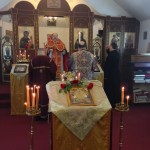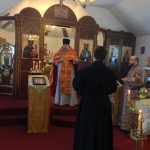On December 15, on the 25th Sunday after Pentecost St. George Church’s Rector, Archpriest Igor Tarasov celebrated the Divine Liturgy in our temple. After the Gospel reading he preached a homily:
“The message of today’s St. Paul’s Epistle lesson is about unity. St. Paul is writing to the Ephesians and all early Christians that they should live “endeavoring to keep the unity of the Spirit in the bond of peace” (Eph. 4, 3). He explains this unity saying that “there is one body and one Spirit… one Lord, one faith, one baptism; one God and Father for all” (Eph. 4, 4-6). So, today we will reflect on the unity. It is very important to be united. Perhaps every nation has proverbs, sayings or parables about the importance of unity. If a nation is united, it can overcome any powerful enemy. If a family is united, it can survive any crisis. Unity is an indispensible condition for a group of people to achieve success.”
“However, if we look at the way we, people, live and relate to each other, we may realize that unity is very desirable, but not often an existing thing. People are divided in many ways. They are conservative or liberal, Republicans and Democrats, pro-life and pro-choice, Christians and Jews, believers and atheists. To make the issue trivial, let us recall that we have different taste. People like different food or different colors. People have differences. We are different in many ways. And in many instances it is totally appropriate to be different, to hold a distinct opinion or to like what somebody else does not like. God created us to be different, to be individual persons. But in some cases people need to be united. In some instances differences become very dangerous, if not fatal. If a boat is sinking, everyone should work together in order to be saved, cooperate with the captain and not express the differences. In such a situation differences in opinion as to what should be done may cost people lives.”
“This is the case when people are bound together in striving to achieve the goal of eternal salvation. Such a group of people is a community of believers called the Church. The Church has to be one, all members should be united by one goal, one way of life, one spirit. Although we are many different persons with many different thoughts, opinions and preferences, we have to share one nature in Christ. As St. Paul believes, this is a new nature uniting Christian community, so it has “one body and one spirit, one Lord, one faith, one baptism” (Eph. 4, 4-6). We have one God in whom we believe, one and only Savior, Jesus Christ whom St. Paul calls “one Lord”. In Baptism we all become able to partake of the same nature. We also become the followers of one teaching, and as St. Paul put it, “called in one hope” (Eph. 4, 4). These are the things in which we may not have differences. These are the points about which we may not argue. It would be improper or dangerous to argue about that. Therefore, St. Paul warned his spiritual children that they have to preserve unity in faith.”
“Speaking of these signs of unity St. Paul reveals us a mysterious reality of life of the Holy Trinity in the Church. He tells us about one God, one Lord and one Spirit, the Three divine Persons of the Trinity, God the Father, Son and Holy Spirit. He also combines one Baptism and the three virtues of faith, hope and love into one great reality. Each Person of the Trinity sanctifies us, but the sanctification is one, because our Baptism is one, and the grace of that Sacrament is one.”
“Therefore, dear brothers and sisters, we need to preserve the unity of faith. We cannot divide the body of Christ, the Church. We cannot separate ourselves from it. But there may be a question how this unity should appear. St. Paul describes it very briefly is “the unity of the Spirit in the bond of peace” (Eph. 4, 3). Should it be then a uniform group of people with the same views, customs and habits? Or, on the contrary, should it be a unity in diversity where each person or each particular group has certain distinctive features? Should it be a “melting pot” or a beautiful mosaic? This country, the United States, was first tending to be a melting pot for the nationalities joining here together, but later it began to consider itself rather a beautiful mosaic consisting of different ethnic and religious groups with their different customs, cultures and traditions. This kind of unity gives strength to this nation.”
“Same kind of unity should be preserved in the Church of Christ. Resembling the mysterious unity of the Three Persons in the Holy Trinity, the Church has different traditions, customs of the different nationalities that all united in the same Universal Church. We have such differences between the Greek and Russian Church. We have also some distinctions between each ethnic Orthodox community, between the Russians, Serbs, Romanians and so on. But all of us united in the same faith, same Baptism, same hope to achieve salvation. Some people may visit a Greek parish and say, “Oh, they pray, sing and serve differently. There is something wrong with them!” These people would be mistaken. The Greeks are of the same Orthodox faith as we are. Even in the same national Church there may be some slight differences between one parish and another. And again, some people may go to another parish and say that there is something wrong there. They are mistaken. The Church is not a melting pot. It is a unity in diversity.”
“Therefore, dear brothers and sisters in Christ, let us not forget one hope of our calling (Eph. 4, 4). Let us keep the unity of one faith, hope and love, the unity in one Spirit, one Lord and one Baptism, in “one God and Father of all, who is above all, and through all” (Eph. 4, 6).”
After the Liturgy dismissal Fr. Igor congratulated our parishioner and sacristan, Andrew Malyshew on the occasion of his past name day and wished him God’s blessings and many happy years. A traditional polychronion (“Mnogaia leta”) was sung.
The Rector also said a brief sermon about the feasts of the coming week, especially about St. Nicholas Day (December 19). He also reminded of the days of commemoration of the Old Testament Prophets during this time of the Nativity fast. Fr. Igor called the parishioners to spend this season of fasting reading the Scripture, especially the books of the Old Testament prophecies about coming of the Messiah into the world. That coming was prophesized in those books and we now spiritually expect to celebrate it on Christmas.


